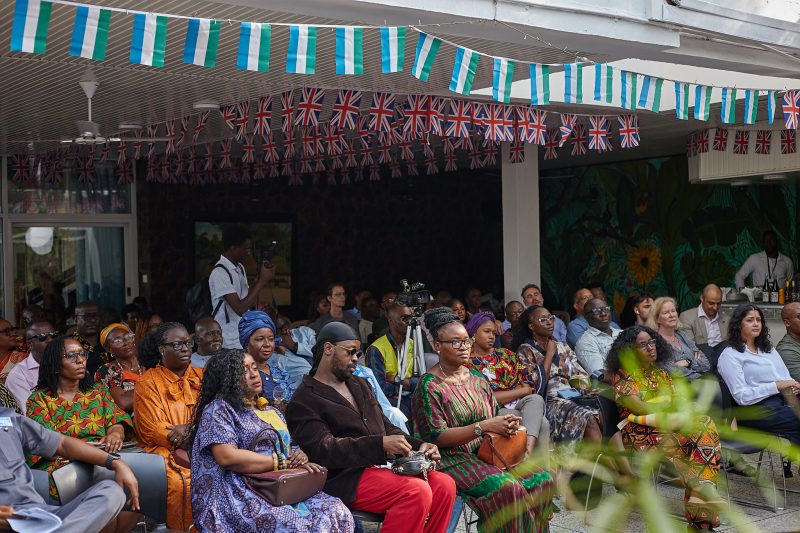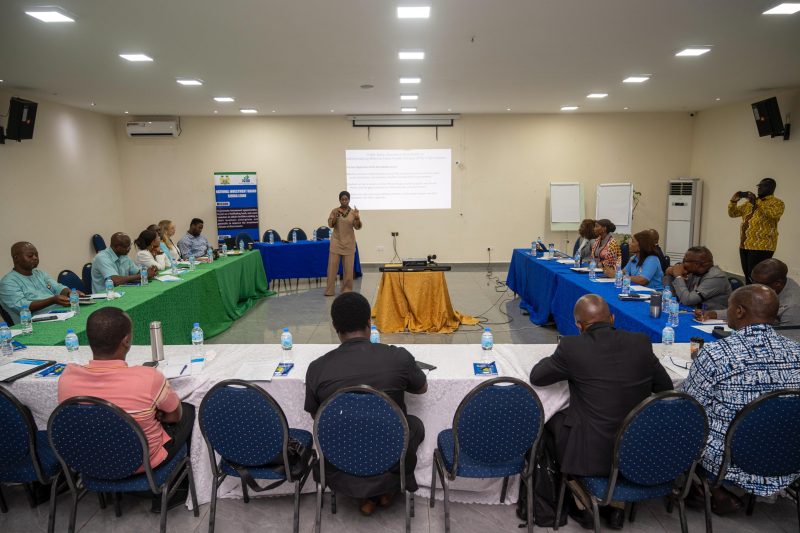Members of Sierra Leone’s banking and financial sector gathered at a recent roundtable to hear the story behind Sierra Leone’s first local currency bond, and to find out why it is such an important step towards expanding affordable financing solutions for the country’s private sector.
The roundtable was organised by Invest Salone, a UK-funded private sector development programme. Christina Clark-Lowes, Invest Salone’s Investment Lead, opened the roundtable discussion by explaining that Sierra Leone has one of the lowest rates of private sector credit to GDP in the world, which reduces opportunities for businesses to grow. “Expanding access to finance is a key element of Invest Salone’s work to support a more competitive private sector in Sierra Leone,” she said. “Boosting the availability of local currency financing is a particular priority to protect businesses from currency market volatility, to unlock long-term financing opportunities, and potentially bring down borrowing costs.”
The story behind the bond
Invest Salone conducted a feasibility study into structuring a local currency corporate bond, and found that all the key ingredients for a successful transaction were present. Further research considered potential stakeholders, such as an issuer, arranger, rating agency and investors. This led Invest Salone to LAPO SL, a microfinance institution linked to the Nigerian NGO LAPO whose clients are 75% women.
The bond, which reached closure in June 2024, raised SLE32 million (approximately US$1.4 million) for LAPO SL from anchor investor the Africa Local Currency Bond Fund (ALCBF) and local investor Skye Bank. The bond was arranged jointly by United Capital Plc, a leading pan-African investment banking firm, and Pennarth Greene, a Sierra Leonean-based corporate finance advisory firm.
Breaking new ground
As this was the first transaction of its kind in Sierra Leone, the participating organisations had to develop the process from scratch.
The Bank of Sierra Leone’s primary role was to ensure the suitability of the issuer and arrangers and, in the absence of a Securities Exchange Commission, to act as the regulator for the transaction.
A local law firm, Wright and Co. (Solicitors), was contracted to draft the trust deed, review the prospectus and draft a legal opinion.
Anrite Thompson, a barrister partner with the firm, explained: “We don’t have laws regulating local currency bonds in Sierra Leone and had to design the process as we went along. We were all aware that we were making history, and so flexibility and collaboration at each step were essential to ensure the bond issuance was successful. With that in mind, it was important that we made ourselves available to LAPO and other counterparts for consultation on unexpected challenges, without increasing the cost of engagement.”
Rating agencies provide critical information on the ability of an issuer to repay investors, and Invest Salone supported LAPO with the costs of commissioning a credit rating from Agusto & Co., a leading pan-African credit rating agency.
Getting investors on board
As this was a new initiative, investor confidence was a particular challenge, and despite a positive rating from Agusto & Co. the arrangers suggested the introduction of extra controls to build trust. These included a tenure of two years instead of three; an escrow account into which LAPO deposits repayments from its clients; and finally, a partial guarantee for local investors funded by Invest Salone.
Dr Claudius Bart-Williams, from Pennarth Greene, said that these safeguards were important in the context of Sierra Leone’s fledgling bond market – but as the market matures and confidence grows, they should become less necessary. “Persuading investors to invest in a local currency bond with a coupon rate of around 30% instead of treasury bills at over 40% was an added difficulty,” he said. “We addressed this by highlighting the importance of spreading investments across different asset classes and sectors to reduce risks and maximise returns.”
Supporting women and girls
With women making up the majority of LAPO’s client base, Eshiague Gabriel, Managing Director of LAPO, stressed that the bond offered investors the opportunity to actively invest in improving the lives of women and girls. “This bond ultimately benefits our clients, and we are delighted that many more women will have access to finance because of the success of this local currency bond.”
Going forward
Donald Macauley, Deputy Director of the Bank of Sierra Leone, said: “The Bank of Sierra Leone welcomes the successful launch of the first local currency corporate bond. This is a crucial step in developing our capital markets and strengthening our economy. By unlocking new sources of capital, we are empowering local enterprises to expand, create jobs, and contribute to the overall economic prosperity of our nation. The Bank of Sierra Leone remains committed to fostering an environment conducive to sustainable economic growth and looks forward to supporting further development of the corporate bond market and its contribution to our nation’s economic progress.”
Dr Bart-Williams noted with gratitude the renewed focus of the Bank of Sierra Leone on putting the necessary structures in place, and further confirmed that Pennarth Greene and other sector players were now engaged in the process of creating the full issuance infrastructure and accompanying regulations, which will make future issuance less challenging.






